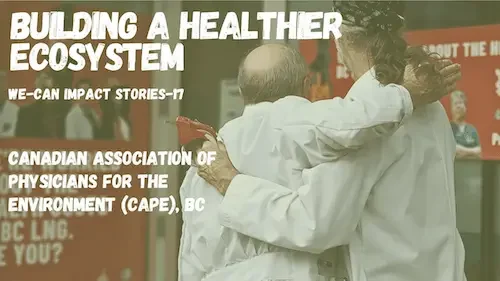By Joslin Jose, WE-CAN with Avi Dolgin.
Founded nationally over 30 years ago, CAPE focuses on the intersection of health, environment, and justice. The BC regional committee, active since 2016, has been at the forefront of campaigns addressing pressing environmental challenges—from fossil fuel dependency to environmental justice for marginalized communities.
July 2025, A Summer Morning
On a bright, sunny morning in Vancouver, Dr. Douglas Courtemanche, a physician, is rushing to a pop-up “clinic” at a weekly farmer’s market.
When he arrives, slightly out of breath from cycling, his five fellow physicians are already gathered at their designated spot. Among the rows of white tents and red tables, it’s hard to miss the small group of white coats standing resolutely under the summer sun.
Dr. Courtemanche and his friends aren’t here to shop or sell anything. They’re gathered to care for one patient’s health: our planet.
Their mission is to inform the public about the health impacts of climate change, inspiring people to take meaningful steps to protect their families and communities. They’re volunteers with the Canadian Association of Physicians for the Environment (CAPE) – BC Committee, a network of physicians across the province dedicated to advancing climate action for the sake of public health.
Curious passers-by stop to listen as the physicians share practical ways to safeguard health—switching to a plant-based diet, reducing reliance on fossil fuels, and learning about the deep, research-proven connection between human health and the environment.
Today, let’s learn more about the group and its initiatives.
CAPE BC
Founded nationally over 30 years ago, CAPE focuses on the intersection of health, environment, and justice. The BC regional committee, active since 2016, has been at the forefront of campaigns addressing pressing environmental challenges—from fossil fuel dependency to environmental justice for marginalized communities.
“CAPE’s superpower is bringing physician voices to the issues of environment and environmental justice from the health perspective,” says Reykia Fick, CAPE’s Communications Director.
Advocacy in Action
CAPE BC has spearheaded multiple campaigns, including raising the alarm about the health harms of LNG and fracking. The team regularly publishes editorials, releases peer-reviewed research, and organizes events focused on planetary and environmental health. They also collaborate with other groups, such as Doctors for Planetary Health, to raise awareness on a national scale.
“CAPE took part in the Rally to save old-growth forest in February 2023 in Victoria, which drew a huge turnout,” recalls Dr. Courtemanche. “We’re also collaborating with the Plastic People documentary to raise awareness about the health impacts of plastic pollution.”
The chapter’s Regional Coordinator for Western Canada, Rhiannon Fox, talked about one of the group’s focuses, which is building decarbonization policies.
“We campaign for gas-free buildings through the Zero Carbon Step Code,” she explains. “We’ve worked with partner organizations to get many municipalities on board, thanks in part to physicians explaining the health risks of having gas at home. Now, our focus is on accelerating the transition.”

Their influence extends to the policy arena. In 2024, CAPE BC hosted a booth at the Union of BC Municipalities and supported Vernon’s resolution opposing funding from FortisBC, bringing a health-focused perspective to the debate.
Focus on Social and Environmental Justice
Much of CAPE BC’s work targets the disproportionate impact of climate change on marginalized and Indigenous communities.
“We do advocacy work against fossil fuel and toxic chemical usage specifically for marginalized communities and Indigenous groups,” says Dr. Courtemanche. “We have research on the effects of the heat dome, and fracking in northern BC, and we’re currently studying climate change impacts on these communities.”
This month, led by CAPE Board President Dr. Melissa Lem, they launched an advertising campaign asking the province to prove that fracking and LNG are safe for human health, featuring Indigenous and physician voices.
Rhiannon adds that CAPE BC is also tackling extreme heat. “We’ve partnered with Sierra Club BC to press the province to require heat protection in housing designs and expand urban tree cover,” she says. “During the 2021 heatwave, around 600 people died in BC, with the highest temperatures in areas lacking green cover and affected by the urban heat island effect—often in marginalized communities. That’s where we want to focus our efforts.”
Community Outreach
Public education is at the heart of CAPE BC’s mission. Members regularly attend farmers’ markets, annual meetings at Vancouver Technical College, and community events in their white coats—speaking directly with residents, distributing educational handouts, and encouraging practical lifestyle changes such as adopting plant-based diets and reducing fossil fuel use.

“We’ve also staged creative actions,” notes Dr. Courtemanche, recalling their campaign against LNG advertisements on Vancouver transit buses. “We’ve held press events outside Vancouver General Hospital and – last week outside the REACH Clinic on Commercial Drive – put up billboards at bus stops, and gotten a great deal of media coverage.”

Looking Ahead
With over 30 active members, CAPE’s BC Chapter remains dedicated to equipping communities with the knowledge and tools to confront climate challenges head-on.
As Dr. Courtemanche sums up: “When doctors get to talk to people, they’re ready to take steps—not just for themselves, but for their children. Our strength is that we can bring “the health voice”. Everyone cares about their health, so they listen. That’s an opportunity to start a conversation!”
So, next time you spot a cluster of white coats at your local farmers’ market, take a moment to stop by and chat. You might leave inspired with simple, powerful ideas to beat the climate crisis!
Resources for further reading:
CAPE website: https://cape.ca/
Get involved with CAPE BC: https://cape.ca/chapter/bc-committee/
Blog and media coverage: https://cape.ca/coverage/page/7/
To Donate: https://act.cape.ca/bc_cape_donation
Read about medical journal articles, publications, news and campaigns of CAPE BC: https://cape.ca/chapter/bc-committee/
Health Reports: https://cape.ca/reports/


